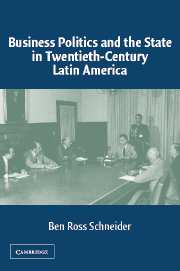Book contents
- Frontmatter
- Contents
- List of Tables
- List of Abbreviations
- Acknowledgments
- PART I INTRODUCTION AND ARGUMENTS
- PART II CASES AND COMPARISONS
- PART III IMPLICATIONS AND CONCLUSIONS
- 8 Economic Governance and Varieties of Capitalism
- 9 Democracy and Varieties of Civil Society
- Appendix A Background Information on Major Business Associations
- Appendix B Interviews
- Appendix C Conversions
- References
- Index
8 - Economic Governance and Varieties of Capitalism
Published online by Cambridge University Press: 23 November 2009
- Frontmatter
- Contents
- List of Tables
- List of Abbreviations
- Acknowledgments
- PART I INTRODUCTION AND ARGUMENTS
- PART II CASES AND COMPARISONS
- PART III IMPLICATIONS AND CONCLUSIONS
- 8 Economic Governance and Varieties of Capitalism
- 9 Democracy and Varieties of Civil Society
- Appendix A Background Information on Major Business Associations
- Appendix B Interviews
- Appendix C Conversions
- References
- Index
Summary
People of the same trade seldom meet together, even for merriment and diversion, but the conversation ends in a conspiracy against the public, or in some contrivance to raise prices.
Adam SmithThe Discrete Charms of the Organized Bourgeoisie
Previous chapters worked to untangle the often turbulent histories of major business associations in the larger countries of Latin America and pinpoint moments of foundation and transformation. These moments were almost always associated with state actions, either deliberate or unintended, that significantly altered the incentives for big business to engage in collective action. The end result was that for most of the second half of the twentieth century, Chile, Mexico, and Colombia had the strongest business associations and the closest approximation overall to liberal or societal corporatism. The two concluding chapters of Part III shift the focus from the causes of greater organizational capacity in business associations to some of the consequences. This chapter considers the question of whether stronger organizations mattered to economic policy making and performance; the next chapter assesses how they affected democracy. The general argument to be developed across these concluding chapters is that stronger associations in Mexico, Chile, and Colombia made more visible and consistent contributions to economic governance and democratic governability than their institutionally weaker counterparts in Brazil and Argentina.
As signaled in Chapter I, there is considerable disagreement over the question of whether an organized bourgeoisie can be expected to have any charms.
- Type
- Chapter
- Information
- Publisher: Cambridge University PressPrint publication year: 2004



